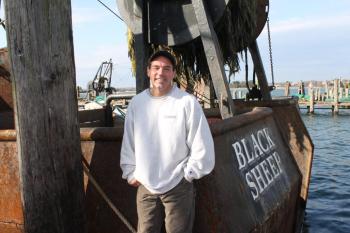Niles Pearsall

Sector Management in New England
This project documents fishery management related changes in individuals, households, and communities in New England.
Elizabeth Wetterhahn
Niles Pearsall, 44, is a commercial fisherman out of Point Judith, Rhode Island. He began fishing after high school and now fishes for groundfish or squid up to 100 miles south of New England. He is a member of Sector 5. He believes that sectors are a good idea, but that everyone needs more quota. Sector management has led to rifts in the fishing community, largely as a result of the disparity in quota allocation. Mr. Pearsall believes that his quality of life is the same, due in part to his wife's income which has made up for his loss in income. He experiences a great deal of stress and anxiety as a result of regulations in general and smokes cigarettes on the boat as a way to mitigate the stress. Mr. Pearsall believes that the science involved with quota allocation is flawed and that sectors will work and fisheries will survive if quota allocation is increased. As it is, the small business fishermen are driven out and big businesses and corporations are taking over. Overall, Mr. Pearsall would like to see an increase in the allotment given to all fishermen, so that they can survive and support their families, especially in Point Judith.
Please Note: The oral histories in this collection are protected by copyright and have been created for educational, research and personal use as described by the Fair Use Doctrine in the U.S. Copyright law. Please reach out Voices@noaa.gov to let us know how these interviews are being used in your research, project, exhibit, etc. The Voices staff can help provide other useful resources related to your inquiry.
The NOAA mission is to understand and predict changes in climate, weather, oceans, and coasts, to share that knowledge and information with others, and to conserve and manage coastal and marine ecosystems and resources. The Voices Oral History Archives offers public access to a wide range of accounts, including historical materials that are products of their particular times, and may contain offensive language or negative stereotypes.
Voices Oral History Archives does not verify the accuracy of materials submitted to us. The opinions expressed in the interviews are those of the interviewee only. The interviews here have been made available to the public only after the interviewer has confirmed that they have obtained consent.
